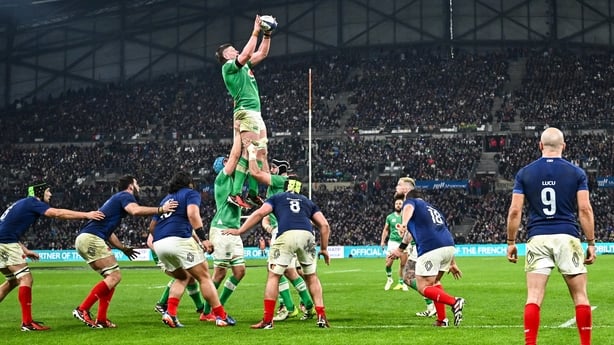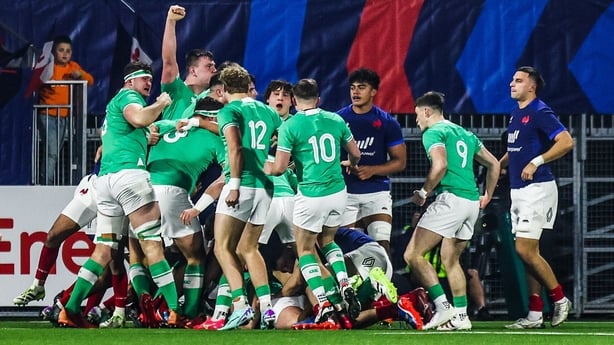A statement of intent, a new era and a victory on the road that will live long in the memory.
Ireland beat France in the Stade Velodrome in Marseille on Friday night in the opening round of the Guinness Six Nations, and it was special.
France were favourites going into the game, and were expected to take advantage of the home draw, relying on their power and strength in depth throughout the squad.
Ireland, on the other hand, are entering a different phase with some high-profile retirements after the World Cup and some doubt surrounding their ability to hit the ground running this year.
How did Ireland go to Marseille and turn over the favourites in the competition?
The spotlight was on Paul O'Connell and the Irish lineout after a shaky World Cup performance. However, their response was immaculate, launching their attacking plays from various positions in the setpiece.
In a dominant opening half, Ireland were 9/9 on their own throw and their defensive effort meant that France were playing off scraps.
Tadhg Beirne and his forward pack turned over four of the French throws and disrupted their delivery on many others, neutralising the French attack.
This area of the game allowed Ireland to roll out their varied and effective wider attack plays, resulting in an early try off just two phases of attack. A short lineout with wide passes from Jamison Gibson-Park to Caelan Doris and another to Bundee Aki, feeding James Lowe on the tackle line allowed them to go at France in a wider channel.
The second phase was a simple tip pass from Robbie Henshaw to the rampaging Aki, who showed how important he is to Ireland’s attack by offloading back inside to Gibson Park. The scrum-half calmly sent Damian Penaud the other way with a dummy before finishing for the opening try in the game.
It all felt too easy but it was borne out of preparation and accuracy in the execution.
Ireland won the gain line far too easily for Shaun Edwards’ liking. His impact on the French defence has been well documented. However, Ireland dented that confidence with ease, with a combination of good footwork, pass accuracy and a strong platform from the setpiece. It made life very difficult for France and their line speed was non-existent.

The whole game was underpinned by Ireland’s kicking game. France are renowned for their kicking strategy. That attacking flair only comes into play when they’ve set themselves up territorially.
Lowe was influential in Ireland winning the kick battle by 350 metres. Ireland kicked 33 times in comparison to just 20 kicks from the French. I don’t know if France decided tactically to kick less because of Ireland’s counter-attack acting like another setpiece to them, launching plays from Doris on the carry.
France are perceived to be an attacking team despite kicking the leather off the ball in their own half. They’ve often kicked over 40 times in a really effective attacking display.
This time Ireland controlled that territorial battle, and although they got it wrong at times with two kicks going dead from Jack Crowley and another clearing kick going dead from Gibson-Park, they stuck to the strategy and it went a long way to winning the game.
Luck might have been on the Irish side, just one more revolution of the ball might have seen Lowe regretting his decision to kick long, but generally he got his kicking game spot on throughout.
What was noticeable is that Ireland purposely kept the ball in play on two of Lowe’s long clearing kicks. Those kicks don’t go that far in field by mistake. Ireland were aware of the French kicking contest and decided to enter that battle willingly.
The red card was obviously a factor in Ireland getting over the line, but they were in full control in the opening quarter so that can’t be used as the reason why Ireland won.
Ireland weren’t without their own errors; that was always going to be the case in France with some younger players taking on leading roles in their strategy. There were two big moments of the game where the momentum shifted.
Crowley missed a kick at goal, which quickly led to a Joe McCarthy knock-on, a dominant French scrum led to a French penalty and instead of going 13-0 up, France had cut the lead to just seven points.
In the second half, Crowley had kicked a penalty into the French 22 and the game was about to be put to bed, however a harsh penalty reversal led to a French attack, a yellow card for Peter O’Mahony and a try which brought the score from 24-10 to 24-17.

Ireland will look closely at those moments. Twice they could have put big distances between the teams and they allowed France to claw their way back into the game.
However, despite some mistakes, Crowley and player of the match Joe McCarthy drove Ireland on to another level and they never looked like losing. The energy that they brought ensured that Ireland left their World Cup hangover back in 2023.
They will now be favourites for the tournament and are in full control of aiming for the back-to-back Grand Slam.
It must be said that the French attack looked rudderless at times, changing direction with limited numbers and very little punch in attack, besides their 10-minute flurry at the end of the first half.
There is no doubt that they’ve relied heavily on Antoine Dupont who gets them out of trouble when the attack becomes unstructured. Yet, Ireland have to be credited for how they made life difficult for Maxime Lucu. They attacked the breakdown, upset the French rhythm and focused their low tackles on the gigantic French forwards.
Standout performances from Tadgh Beirne, Aki, Gibson-Park, McCarthy and Crowley, backed by many other efforts from the likes of Doris, O’Mahony and Hugo Keenan, meant that Ireland controlled the game.
They will now enjoy a nine-day turnaround before they welcome Italy back to the Aviva. There may be a few changes to the team to keep things fresh, possibly including Garry Ringrose and giving Ciaran Frawley a longer stint from the bench. Hopefully Calvin Nash will recover from what seemed like a nasty dead leg, because this Italy fixture is an important one to allow his momentum to continue.
Italy will bring a different challenge on the tackle line. The Italian passion is evident in their condensed defensive line backed by fast line speed to get into the opposition faces.
With a longer turnaround from a Friday to a Sunday game, Ireland are under less pressure to make changes, with a week off after the Italy game as well. Farrell can make changes by choice and not necessity, aside from the potential loss of Nash in the short-term.
Don’t expect a lot of change though. We could see Ryan Baird at six or Beirne’s role changing to allow James Ryan into the squad. Wholesale changes won’t happen because Italy are a challenging team to break down and Farrell will want to build on the momentum of last week.
Younger players should be given the chance to build on their win away in Marseille. The next era of Irish rugby is well and truly upon us, spearheaded by McCarthy and Crowley.
Follow the RTÉ Sport WhatsApp channel for the best news, interviews, analysis and features, as well as details of our sports coverage across all RTÉ platforms.
Watch England v Wales in the Guinness Six Nations on Saturday from 4.15pm on RTÉ2 and RTÉ Player

